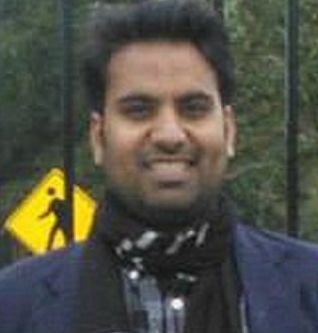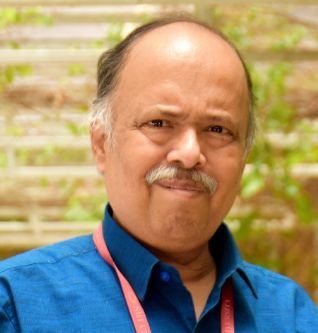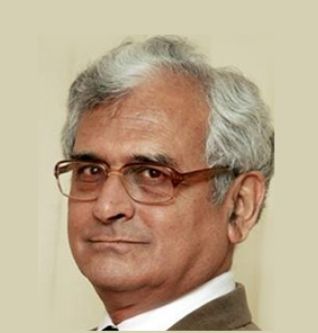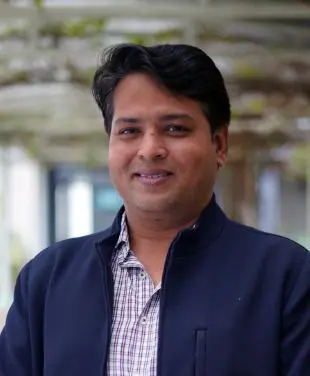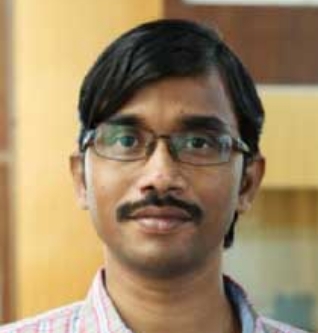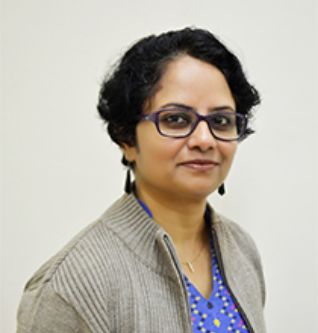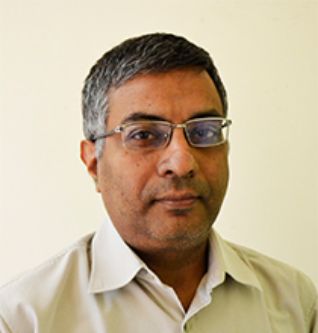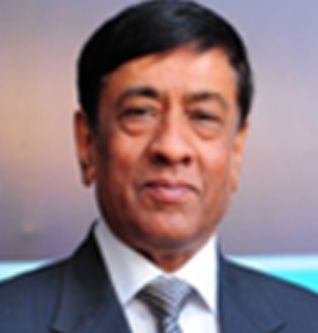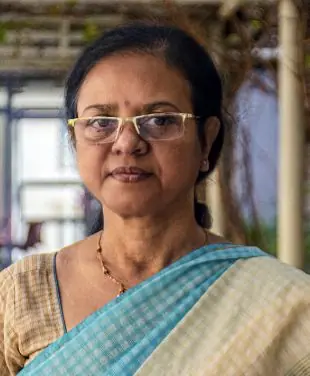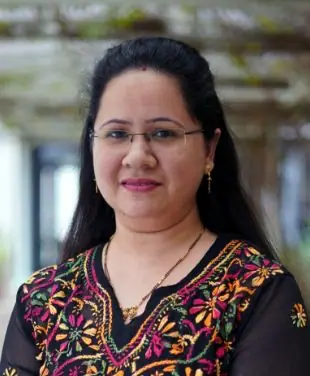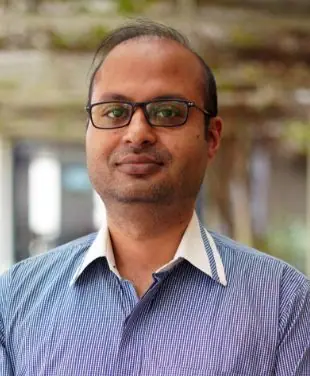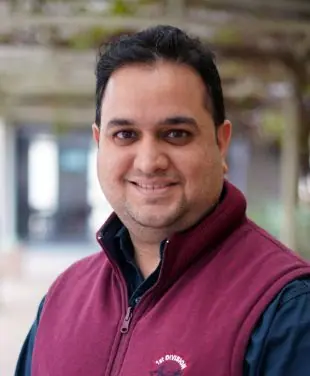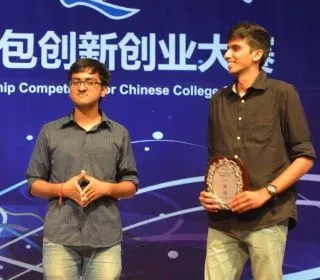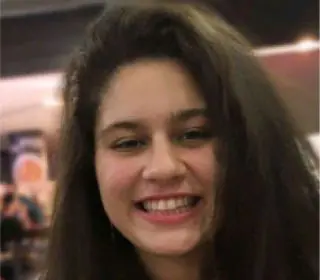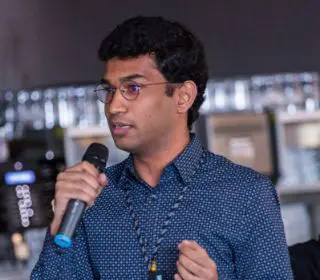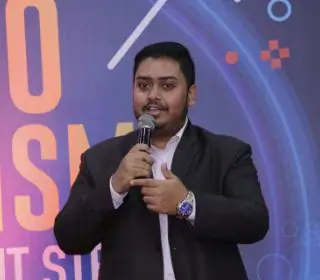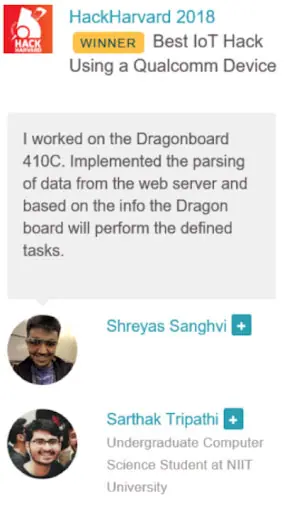B Tech Computer Science Engineering
BTech CSE subjects, syllabus, specialisations, placements, highlights and more.
B Tech Computer Science Engineering: Overview
Purpose of the programme
NIIT University’s (NU) B Tech Computer Science Engineering (CSE) programme aims to create a pool of multi-faceted, problem-solving computer science graduates, who will lead the way in finding problems and solving them when they move into the industry or build their own startups. NU’s purpose is to create an environment that provokes thinking, and enables free-flowing, flexible, limitless and holistic learning for students. NU is on a mission to make higher education industry-linked, technology-based, research-driven and seamless.
NU conducted a brand survey in the latter half of 2021. “What sets NU students apart?” we asked our industry partners, during the survey. A significant percentage of them, who have hired our students, said, “NUtons are problem solvers and are among our best hires. – The NU Brand Survey, 2021
B Tech Computer Science Engineering Highlights
Advanced B Tech CSE syllabus & curriculum
These deep insights from the industry have led NU to infuse the CSE syllabus with relevant and advanced digital technologies that will enable our students (NUtons) to add immense value to the organisations that hire them. The B Tech Computer Science Engineering syllabus is embedded with subjects such as Full Stack Programming, Big Data, Machine Learning, Natural Language Processing, Artificial Intelligence and Internet of Things (IOT) to equip students with advanced and futuristic technology skills.
Our innovative curriculum, pedagogy and assessment methods are aligned to the National Education Policy and geared towards preparing students for the future.
B Tech CSE Level-1 Jobs:
- Java Developer
- Mobile Engineer
- Software Engineer
- Web developer
- Front End Engineer
- Back End Engineer
- Solutions Engineer
- Database Administrator
- Cloud Engineer
- UX Designer
- Network Administrator
- QA Engineer
- Data Analytics – SQL Expert
- Java Developer
- Mobile Engineer
- Software Engineer
- Web developer
- Front End Engineer
- Back End Engineer
- Solutions Engineer
- Database Administrator
- Cloud Engineer
- UX Designer
- Network Administrator
- QA Engineer
- Data Analytics – SQL Expert
B Tech CSE Advanced Jobs:
- Enterprise Architect
- DevOps Engineer
- ETS Consultant
- Cloud Architect
- Data Architect
- Solutions Architect
- API Microservice Designer
- Product Designer
- Technical Program Manager
- Project Manager
- Business Development Manager
- Enterprise Architect
- DevOps Engineer
- ETS Consultant
- Cloud Architect
- Data Architect
- Solutions Architect
- API Microservice Designer
- Product Designer
- Technical Program Manager
- Project Manager
- Business Development Manager
B Tech Computer Science syllabus: Focused on industry immersion
B Tech Computer Science: Undergraduate research
B Tech Computer Science with a customisable curriculum & subjects
Top-notch faculty for B Tech Computer Science
A unique teaching methodology for B Tech Computer Science
A unique teaching methodology is used at NU. This approach helps students to develop independent learning skills and builds a deeper understanding of Computer Science Engineering subjects.
Start-up culture to groom B Tech Computer Science students
At NU you, it’s not just a degree that you walk out with. We encourage you to explore, innovate and take risks. We groom you to become successful entrepreneurs. Our Centre for Innovation, Incubation & Entrepreneurship (CIIE) plays a pivotal role in helping build student-owned startups at NU. The grooming at NU ensures that our students (NUtons) acquire strong problem-solving capabilities and are able to think of bold ideas that ultimately transform into successful startups.
The growing list of startups from NU bears testimony to the university’s purpose of provoking original thinking and creating problem solvers out of students. NU has so far given birth to 29 start-ups across. Here is a list of some of the startups built at NU.
- Czar Securities & Astra Securities
- AT-Lead
- Raav Technologies
- Azukarin
- Limewit
Placements – B Tech Computer Science Engineering
NIIT University is the preferred hiring destination for 700 active industry partners from IBM and Tata Consultancy Services to Morgan Stanley and Deloitte, to Zomato and Big Basket. Our unique placement process begins right from the first year. We groom our students and help them develop skills that empowers them when they step out into the real world. Our active career development council along with initiatives like ‘design my future’, ‘industry practice’, and ‘summer internships’, propel our students forward into their career of choice.
Our B Tech CSE students are a sought-after lot in the industry. Their higher-order thinking abilities, problem-solving skills combined with their entrepreneurial spirit give them a sharp competitive edge. NU’s deep-rooted and longstanding industry partnerships.
Since inception, NU’s B Tech programmes have retained the 100% placements track record*. Even during the pandemic period, the record has remained intact.
100%
₹29.64
Lakhs per Annum Highest CTC
Placement partners
Students pursuing this stream find rewarding professional opportunities with reputed organisations.
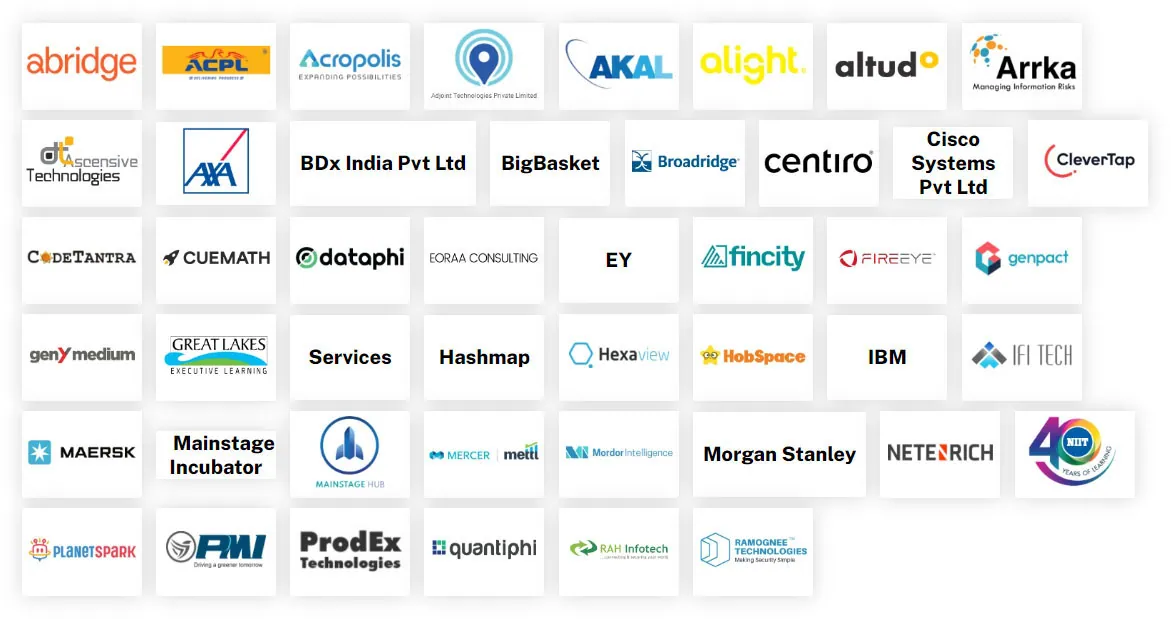
B Tech Computer Science Engineering Course Outline
- Programme core – humanities, social sciences and management – to acquire interdisciplinary knowledge
- Professional core – To gain proficiency in a particular domain
- Mathematics and Basic Sciences – to develop analytical ability
- Professional electives – To specialise in an industry-specific domain
- R&D project – To inculcate a research-focused bent of mind
- Capstone project – To groom students in cutting-edge technologies and industry best practices
- Open electives – To identify professional interests
- Industry Practice – To build seamlessness with the world of work through Industry-work or industry-oriented research
- Minor programme (optional certification) – Starting the fourth semester, students must complete three to five additional courses with credits ranging from 12-15 within the duration of the degree programme.
- Fundamentals of Computer Programming
- Data Structures
- Computer Networks
- Object-oriented Programming
- Design and Analysis of Algorithms
- Computer Architecture and Organisation
- Discrete Mathematics
- Database Management Systems
- Operating Systems
- Software Engineering
- Theory of Computation
- Introduction to Communication Systems
- Multi-device Programming
- Advanced Java Programming
- Artificial Intelligence
- Artificial Neural Network
- Introduction to Soft Computing
- Introduction to Internet of Things
- Statistical Modeling for Data Science
- Advanced Communication Networks
- High-Performance Computing
- Introduction to Linear and Non-Linear Optimisation
- Wireless Sensor Networks and Applications
- Computer Vision
- Mobile Platform Programming
- Web Intelligence and Algorithms
- Machine Learning
- Computational Geometry and Applications
- Cyber Security
B Tech CSE Subjects & Syllabus
| B Tech CSE – Category of Courses | Credits |
|---|---|
| Mathematics and Basic Sciences | 20 |
| Engineering Sciences | 22 |
| Professional Core Course | 52 |
| Professional Electives Course | 20 |
| Open Electives Course | 12 |
| Project Work, Internship, and Industry Practice | 32 |
| Humanities and Social Science | 18 |
| Environmental Sciences | Audit Course |
| Total Credits to be Earned | 176 |
| B Tech CSE – % LTP | |
|---|---|
| Lectures | 61% |
| Tutorials | 4% |
| Practicals | 35% |
| # | Course code | Course | L | T | P | C |
|---|---|---|---|---|---|---|
| 1 | MAT 112 | Calculus | 3 | 1 | 0 | 4 |
| 2 | Science-I | 3 | 0 | 2 | 4 | |
| 3 | EL 111 | Fundamentals of Electronics | 3 | 1 | 0 | 4 |
| 4 | TA 111 | Fundamentals of Computer Programming | 2 | 0 | 4 | 4 |
| 5 | TA 202 | Engineering Graphics/Workshop Practice | 2 | 0 | 2 | 3 |
| 6 | TA 212 | 1 | 0 | 4 | 3 | |
| 7 | TA 102 | Communication Skills/HSSM-I | 2 | 0 | 2 | 3 |
| 8 | NU 111 | Community Connect | 0 | 0 | 2 | 1 |
| Total Semester L-T-P-C | 16 | 2 | 16 | 26 |
| # | Course code | Course | L | T | P | C |
|---|---|---|---|---|---|---|
| 1 | MAT 101 | Algebra and Differential Equations | 3 | 1 | 0 | 4 |
| 2 | Science II | 3 | 0 | 2 | 4 | |
| 3 | CS 102 | Data Structures | 3 | 0 | 3 | 4 |
| 4 | EL 101 | Digital Logic and Circuit | 3 | 0 | 2 | 4 |
| 5 | TA 202 | Engineering Graphics/ Workshop Practice | 2 | 0 | 2 | 3 |
| 6 | TA 212 | 1 | 0 | 4 | 3 | |
| 7 | HSSM-I | HSSM-I | 3 | 0 | 0 | 3 |
| 9 | NU 112 | Community Connect | 0 | 0 | 2 | 1 |
| Total Semester L-T-P-C | 18 | 1 | 15 | 26 | ||
| # | Course code | Course | L | T | P | C |
|---|---|---|---|---|---|---|
| 1 | MAT 221 | Probability & Random Process | 3 | 1 | 0 | 4 |
| 2 | CS 122 | Computer Arch. & Organization | 3 | 0 | 2 | 4 |
| 3 | CS 201 | Design & Analysis of Algorithms | 3 | 0 | 2 | 4 |
| 4 | CS 232 | Discrete Mathematics | 3 | 1 | 0 | 4 |
| 5 | CS 251 | Object Oriented Programming | 2 | 0 | 4 | 4 |
| HSSM-II | 3 | 0 | 0 | 3 | ||
| 6 | NU 211 | Community Connect | 0 | 0 | 2 | 1 |
| Total semester L-T-P-C | 17 | 2 | 10 | 24 | ||
| # | Course code | Course | L | T | P | C |
|---|---|---|---|---|---|---|
| 1 | CS New | Computer Networks and Data Communication | 3 | 0 | 2 | 4 |
| 2 | CS 231 | Database Management Systems | 3 | 0 | 2 | 4 |
| 3 | EL 302 | Digital Image Processing | 3 | 0 | 2 | 4 |
| 4 | CS 211 | Operating Systems | 3 | 0 | 2 | 4 |
| 5 | CS 302 | Theory of Computation | 3 | 1 | 0 | 4 |
| HSSM-III | 3 | 0 | 0 | 3 | ||
| 6 | NU 212 | Community Connect | 0 | 0 | 2 | 1 |
| Total semester L-T-P-C | 18 | 1 | 10 | 24 |
| # | Course code | Course | L | T | P | C |
|---|---|---|---|---|---|---|
| 1 | CS 322 | Artificial Intelligence | 3 | 0 | 2 | 4 |
| 2 | CS 3132 | Cloud Computing Concepts | 3 | 0 | 2 | 4 |
| 3 | Open Elective – I | 3 | 0 | 2 | 4 | |
| 4 | CS 252 | Cryptography | 3 | 1 | 0 | 4 |
| 5 | CS 301 | Software Engineering | 3 | 0 | 2 | 4 |
| 6 | HSSM-IV | 3 | 0 | 0 | 3 | |
| 7 | NU 311 | Community Connect | 0 | 0 | 2 | 1 |
| Total semester L-T-P-C | 18 | 1 | 10 | 24 | ||
| # | Course code | Course | L | T | P | C |
|---|---|---|---|---|---|---|
| 1 | CS 332 | Compiler Design | 3 | 1 | 0 | 4 |
| 2 | Professional Elective – I | 3 | 0 | 2 | 4 | |
| 3 | Professional Elective – II | 3 | 0 | 2 | 4 | |
| 4 | CS 392 | Capstone Project – I | 2 | 0 | 4 | 4 |
| 5 | NU 302 | Research & Development Project | 1 | 0 | 6 | 4 |
| 6 | HSSM-V | 3 | 0 | 0 | 3 | |
| 7 | NU 312 | Community Connect | 0 | 0 | 2 | 1 |
| Total semester L-T-P-C | 15 | 1 | 16 | 24 | ||
| # | Course code | Course | L | T | P | C |
|---|---|---|---|---|---|---|
| 1 | Professional Elective – III | 3 | 0 | 2 | 4 | |
| 2 | Professional Elective – IV | 3 | 0 | 2 | 4 | |
| 3 | Professional Elective – V | 3 | 0 | 2 | 4 | |
| 4 | Open Elective – II | 3 | 0 | 2 | 4 | |
| 5 | Open Elective – III | 3 | 0 | 2 | 4 | |
| 6 | Capstone Project – II | 2 | 0 | 4 | 4 | |
| 7 | NU 312 | Community Connect | 0 | 0 | 2 | 1 |
| Total semester L-T-P-C | 17 | 0 | 16 | 25 | ||
| # | Course code | Course | L | T | P | C |
|---|---|---|---|---|---|---|
| 1 | NU 402 | Industry Practice/Project | 0 | 0 | 40 | 20 |
B Tech Computer Science Specialisations
- Data Science: A specialisation in Data Science gives students the knowledge, skills and tools needed to handle complex data from all possible domains. It prepares students to acquire, manage, and elicit meaning from data for improved decision-making in the business world. NU also offers a B Tech degree in Data Science.
Acknowledging the huge demands of Data Science professionals in the industry today, the programme in Data Science has been designed to create trained computer science graduates to fulfill the requirements of the industry. The programme content is co-designed with an industry partner. Students are shortlisted by the industry partner at the beginning of sixth semester and go through a set of special electives during sixth and seventh semesters, offered in collaboration with the industry partner.
We are very impressed with both the skills and attitude of NU graduates who have gone through the Analytics and Cognitive (Data Science) programme. They demonstrate terrific aptitude and attitude towards learning. We need more such graduates and they are performing significantly above the mass hired engineering graduates we hire from the top engineering institutions. The curriculum for the programme is jointly designed by IBM (Cognitive group) and NU faculty and reflects the dynamic and changing requirements in the market place.” — Vijay Muralidharan, Data Science Leader, Cognitive & Advance Analytics CIC, IBM.
- Cyber Security: Specialising in Cyber Security prepares students to identify and assess cyber threats, and design, configure and implement solutions to secure networks including global, industry-specific and networks critical to the nation such as governance, banking, energy, transportation, etc, using the latest technologies and tools for encryption, firewalls and malware protection. NU also offers a B Tech degree in Cyber Security. Czar Securities, a startup founded at NU, is a stellar example of how a specialisation in this field can help to build ground-breaking solutions.
- Artificial Intelligence: A specialisation in AI equips students with the ability to build intelligent applications and machines to solve complex problems with the use of advanced technologies like machine learning, machine vision, AI, etc. Raav Technologies, another startup founded at NU is a great example of how the world’s problems can be solved by AI.
- Big Data Engineering: A specialisation in Big Data Engineering equips students with key concepts of Big Data tools & skills such as functional programming such as functional programming using python, distributed computing, data ingestion tools, NoSQL data base and so on.
- Cloud Computing: With a specialisation in Cloud Computing, students are well-equipped to understand and apply the concepts, principles and techniques of Cloud Computing and Virtualisation to model, analyse, design and deploy them for building and maintaining industry applications.
- Geomatics: The CSE area introduced the new specialization to enhance employability in the area of earth science, smart city design, remote sensing and Drone Photogrammetry. Incidentally, NU’s BTech students have always been undertaking GIS projects as part of their R&D project course. In the previous year, two awards were received by NU BTech CSE students who have taken-up research in Geomatics Engineering. Neeharika Gupta, won the Best Paper Award in InGARSS-2021 Mayuri Mane and Trisha Sharma won 1st Position in AABTonics-2021
B Tech CSE: Industry projects
Industry projects at NU give our students the dual advantage of academic rigour and industry relevance. It gives them the opportunity to explore new problems and find solutions. IBM has been an industry practice partner for NU for more than a decade. This strong partnership that started from the time when the university was founded, continues to flourish and we expect it to reach newer heights in the future. NU has developed many other such strong industry relationships giving NUtons the limitless opportunity to look for new problems and solve them while they are still studying at the university. Such real-life problem solving skills surely holds them in good stead when they step out to the real world.
Here’s a glimpse of some of the industry projects our B Tech CSE students have been working on, during their Industry Practice
| Company | Domain | Project |
|---|---|---|
| IBM | Threat Intelligence | Working on multiple sources and consolidating threat information for specific case studies |
| IBM | Identity Governance and Intelligence | Managing identities and entitlements of users in an organisation |
| Genpact | Python | Forecasting new products for the market using different algorithms, hierarchical time series, etc. |
| Swiggy | Helms | Improving vehicle tracking (GPS + IMU), DE state detection |
| Tenovia | AWS Data Lake | Streamlining multiple data inputs from APIs to the pipeline and enabling dashboards for analytics on the cloud |
| Thoucentric | Full-stack Development | Showcasing projects and tools from over the years to potential clients |
| Zscaler | Cloud Security Posture Management | Alerting, reporting, managing views |
| Morgan Stanley | Introducing Redis Cache for a regulatory calculation process | Introducing Redis Cache for a regulatory calculation process |
| Ahoy System | Fire control panel with wire smoke Sensor and Analog Devices. | Creating a fire control panel using B401 plug-in detector base and low-power analog devices |
| Zomato | MLFlow models version control on GitHub | Creating a custom flow that enables Zomato to keep track of deployed, as well as previous models with version controlling of inference code |
Read the story here .
Watch his story here.
Read the story here.
Other startups launched by our B Tech CSE students include Afterkite Web Pvt Ltd by Shubham Sharma (Class of 2014), LolChef by Saharsh Tibrewal (Class of 2014), PeerXP by Kandregula Manoj Kumar (Class of 2018), GruteBox by Ujjwal Ranjan (Class of 2019), Adveert by Gourang Aggarwal (Class of 2019), Medwle by Rakshith R Gopidi (Class of 2020), and Tandoorman Hospitality by Rakshith Reddy (Class of 2020).
Faculty & Infrastructure
Student stories
Student achievements
NUtons win 1st position in an International GIS competition AABtonics organized by AABSyS IT
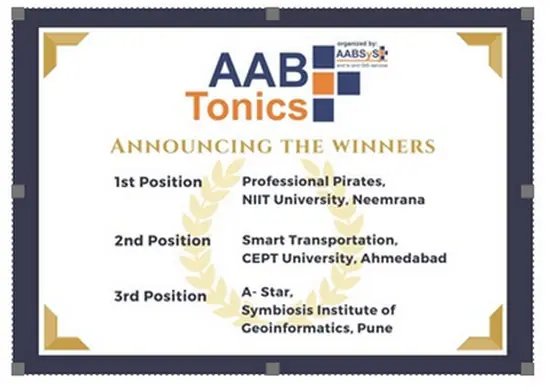
The team has two members with a mentor. The first member of the project is Mayuri Mane, a B Tech CSE student in the 4th year of her engineering. She is specialised in data science and has been working as the implementer of the project since January 2021. She performed the analytic calculations and numerical simulations. The second member of the project is Trisha Sharma, a B Tech CSE student, also in her 4th year of engineering and specialising in data science, who is the shaper of the project. She has been working on the technicals as well as sorting useful and arbitrary details to come up with a big-picture perspective.
Hillytech Hackathon – NUtons ace the challenge
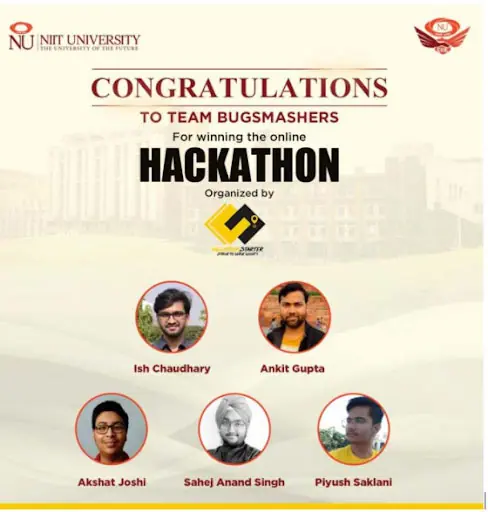
Under the aegis of Startup India and MSME, Hillytech Starter runs a unique online hackathon. Students are expected to come up with innovative solutions to the industrial and societal problems faced by people living in hilly areas. The competition covers different themes such as science, technology, networking & business, electronics and even the pandemic.
One hundred and twenty teams from across the country participated in Hillytech Hackathon 2020. The criteria for evaluation included the novelty of the idea, feasibility of the implementation, and whether it will sustain in the current market. Prizes ranged from internships to job opportunities, apart from cool gadgets and gift hampers. NU’s Team Bugsmashers secured the first position with their unique ‘Outdoor plant monitoring and tracking system’ that monitored weather, automated irrigation, measured soil quality, organised plant care and sent reminders about fertilisers and pest control.
NASA Space Apps Challenge 2020 – NU’s ‘The Bug Slayers’ declared Global Award nominee

NASA Space Apps Challenge 2020 was organised by NASA in collaboration with Hacker’s Tribe Foundation. The event saw the participation of over 26,000 people from nearly 150 countries. ‘The Bug Slayers’, who represented NU, received the Global Award Nominee in the Phase 1 Universal Event.
The team proposed a specialised algorithm that suggests sleeping slots and the number of sleeping cycles for a user to work at maximum efficiency. This will help the user rest properly and balance their busy schedules. Further, depending on the user’s entered activity status and programme, the algorithm would also provide a daily customised calorie requirement and proposed carbohydrate, protein and fat intake.Hult Prize OnCampus Event – NU team’s BioPure declared winner
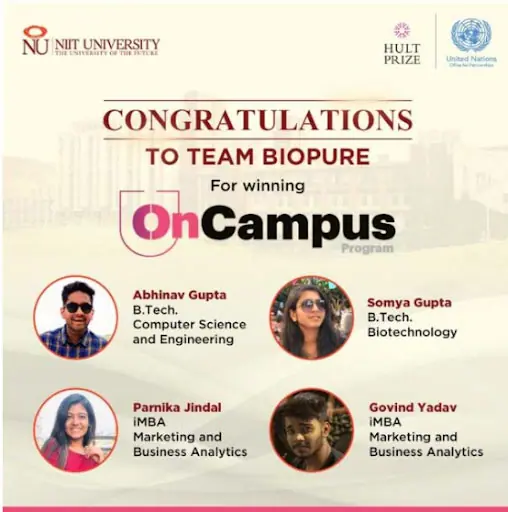
An international idea-pitching competition, the Hult Prize competition is a year-long event with multiple phases – the campus round, regionals, an accelerator programme and the final round. The global programme provides an opportunity for students to suggest startup ideas which they believe can bring about social or global change. The theme for the 2020 competition was ‘Food for Good’.
The OnCampus event was organised in NU on 5 December 2020 by a team of NUtons, led by campus director Aman Gupta. Forty students in ten teams participated in the event. NU’s Team BioPure was the winner, going on to represent NU in the Regional Round, held in various destinations across the globe.
BioPure is a new-gen packaging start up that aims to revolutionise food packaging for Indian farmers. A vast quantity of food is wasted every year due to moisture, rodents and the fragility of packaging.
BioPure’s winning idea was to produce biopolymer food storage packaging based on nanotechnology. The durable, affordable and reusable packaging ensures effective food packaging and storage, reducing overall wastage. At BioPure, all packaging is sourced responsibly, and is designed to be effective and safe throughout its life cycle, thus making it a valuable resource for subsequent generations.
NU’s Anushree Krishania (B Tech CSE) is first runner-up at the i4C (Inter Institutional Inclusive Innovations Center) Blogathon
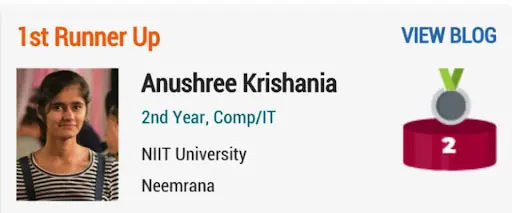
i4C2020 received over 350 entries from all over the country. Anushree’s article, in the Student Innovation category, was based on health care innovation. It secured her the first runner up position in her category.
Please read her article here
NU team secures first runner up position at Smart India Hackathon 2019
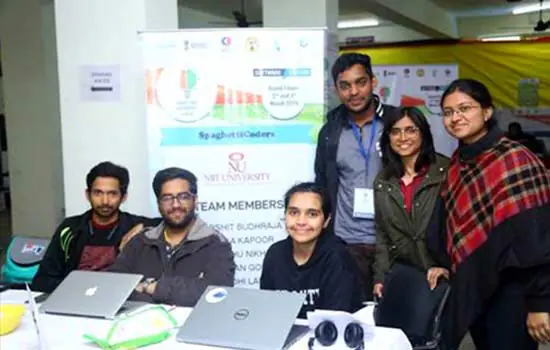
NUtons make us proud at 'Junction 2018' - Europe's largest Hackathon
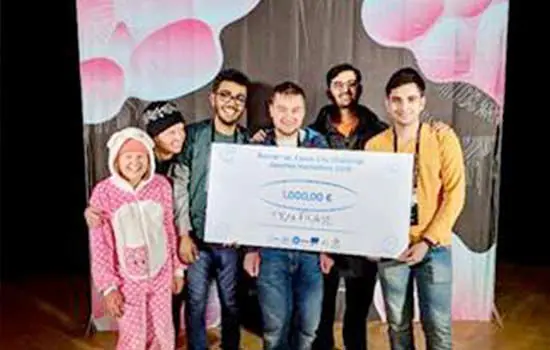
NUton Hitesh Mittal's paper accepted for Poster Presentation at PHOTONICS 2018
Hitesh Mittal (B Tech CSE), along with ECE Faculty Dr Nitin Bhatia, submitted their paper titled ‘Broadcasting a laser using Bragg grating for free-space optical communication’ to PHOTONICS 2018, the International Conference on Fiber Optics and Photonics.
Their submission was accepted for Poster Presentation at the conference. PHOTONICS 2018 was held at the Indian Institute of Technology, New Delhi. In their paper, the authors demonstrated a technique for broadcasting a laser source in free space using a Bragg grating. The multiple diffraction orders are used as multiple receiving points. They also show that cascaded gratings would increase the number of receiver points. This method is easy to implement, low-cost and scalable to a large number of receiver points.
NUton Rishi Pisipati's team ‘Thirsty Scholars’ receives the top prize at Carnegie Mellon University’s
'Hack This. Help Kids'. Hackathon
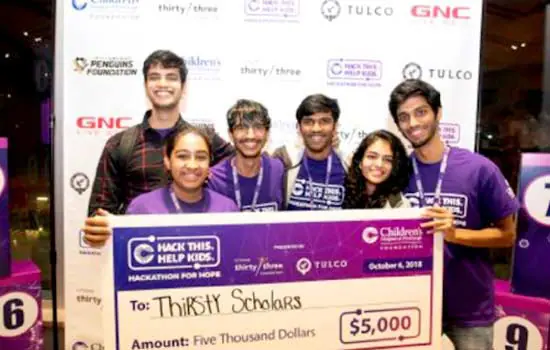
Infrastructure & facilities
Programme outcomes
- PO1: Engineering knowledge : Apply the knowledge of Mathematics, Science, fundamentals of Engineering and an engineering specialisation to the solution of complex engineering problems.
- PO2: Problem analysis: Identify, formulate, review research literature, and analyse complex engineering problems to reach substantiated conclusions using first principles of Mathematics, Natural Sciences, and Engineering Sciences.
- PO3: Design/Develop solutions: Design solutions for complex engineering problems and system components or processes that meet specified needs with appropriate consideration for public health and safety, and cognisant of cultural, societal, and environmental considerations.
- PO4: Conduct investigations of complex problems: Use research-based knowledge and research methods including design of experiments, analysis and interpretation of data, and synthesise information to provide valid conclusions.
- PO5: Modern tool usage: Create, select, and apply appropriate techniques, resources, and modern engineering and IT tools including prediction and modelling to complex engineering activities with an understanding of the limitations.
- PO6: The engineer and society: Apply reasoning informed by contextual knowledge to assess societal, health, safety, legal and cultural issues, and the consequent responsibilities relevant to the professional engineering practice.
- PO7: Environment and sustainability: Understand the impact of professional engineering solutions in societal and environmental contexts, and demonstrate the knowledge of, and need for sustainable development.
- PO8: Ethics: Apply ethical principles and commit to professional ethics and responsibilities and norms of the engineering practice.
- PO9: Individual and teamwork: Function effectively as an individual, and as a member or leader in diverse teams, and in multidisciplinary settings.
- PO10: Communication: Communicate effectively on complex engineering activities with the engineering community and with society at large. This includes being able to comprehend and write effective reports and design documentation, make effective presentations, and give and receive clear instructions.
- PO11: Project management and finance: Demonstrate knowledge and understanding of engineering and management principles and apply these to one’s own work, as a member and/or leader in a team, to manage projects in multidisciplinary environments.
- PO12: Life-long learning: Recognise the need for, and have the preparation and ability to, engage in independent and life-long learning in the broadest context of technological change.
Programme specific outcomes
- 01. Acquire sound knowledge of fundamentals of Telecom Technology, Computer Science, Artificial Intelligence, Machine Learning, Data Science and Data Structures, Cyber-security, Cloud and Edge Computing.
- 02. Acquire sound knowledge and be able to implement and validate hardware and specialised software applicable to LAN, WAN and ad-hoc networks.
- 03. Apply the knowledge in designing and developing IoT-based Systems, Broadband and Wireless Communication Architecture.
- 04. Acquire technical knowledge in digital and distributed control systems, digital signal processing for deterministic as well as stochastic signals, System–on-Chip (SOC) design, microcontrollers – Rasbery and Ardiuno, programming of microcontrollers and Embedded Systems using high-level languages.
- 05. Develop requisite knowledge and skills to integrate diverse systems in business environment and governance, for example, banking sector, finance sector, government sector, corporate sector, etc.
- 06. Learn and implement intelligent, secured and self-learning based software and hardware (receiver–transmitter systems, code generators, filters and power boosters, optical transmitters and receiver systems, switching devices, control devices, etc).
- 07. Deal with ICT management and architecture, and create/manage/deploy database in networking environment.

Programme specific outcomes
01.
02.
03.
Apply the knowledge in designing and developing IoT-based Systems, Broadband and Wireless Communication Architecture.
04.
Acquire technical knowledge in digital and distributed control systems, digital signal processing for deterministic as well as stochastic signals, System–on-Chip (SOC) design, microcontrollers – Rasbery and Ardiuno, programming of microcontrollers and Embedded Systems using high-level languages.
05.
06.
07.
Deal with ICT management and architecture, and create/manage/deploy database in networking environment.
20 NUtons placed at E&Y under Industry Practice
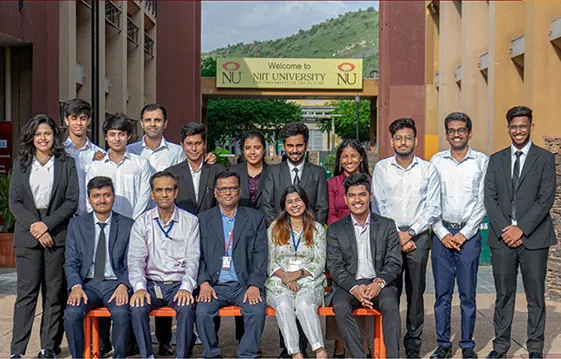
How to Apply
FAQs
What is the difference between Computer Science and Computer Engineering?
| Computer Science | Computer Engineering |
|---|---|
| Computer Science (CS) is a field of science that emphasises on researching data structure & algorithms, database theory, theory of computation, operating systems, and different programming languages. The objective is to solve software issues and develop software solutions or to design software products. CS also focuses on ways to improve the performance of existing software and computer systems. Computer scientists study and conduct experiments in the fields of artificial intelligence (AI), machine learning (ML), computer vision & virtual reality, and cybersecurity to develop new computing techniques and algorithms. Computer scientists are generally more interested in the analysis and manipulation of data, software application development, database systems, artificial intelligence, and computational theory. | Computer Engineering on the other hand, prioritises computer design and development. If you enjoy building computers, learning about hardware, or designing interfaces, you might prefer computer engineering to computer science. If you find yourself fascinated by computing theory and data analysis, a graduate or undergraduate degree in Computer Science might be the better option. Although computer engineers may also write software and handle data, the field of Computer Engineering is generally more focused on the development of physical computing components, circuitry, electronics, robotics, and embedded systems. Computer Engineering focuses on solving problems and designing hardware and software interfaces. Computer Engineers can be responsible for the development and prototyping of software and hardware simultaneously. Computer engineers conduct research on computer hardware and test computer hardware elements like processors, circuit boards, routers, write and assess software programs for digital devices and computers, design and test robots. NU offers BTech in Computer Science and Engineering. |
BCA or B Tech, which is better?
B Tech students are eligible to enrol directly into PhD , but BCA students need to complete MSc or MCA and to become eligible for enrolment into PhD.
How to get a job in ISRO after B Tech CSE?
Here is an overview of the eligibility criteria to apply for ISRO:
- Academic qualification: BE/B Tech with 65% marks.
- Candidates who are in the final year of the qualifying degree can also apply provided they can produce the degree by the time final selections are made.
- Age: Between 21 to 35 years for general category. There is a relaxation in the upper age limit for OBC by 3 years and 5 years for SC/ST candidates.
- A written exam
- Technical interview
- Personal interview
- Certificate verification
Did you know? Dr K Kasturirangan, the former director of ISRO is now Chairperson (Chancellor’s equivalence).
